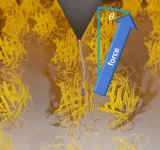(Press-News.org) BOSTON-- Humans are colonized with thousands of bacterial strains. Researchers are now focused on genetically modifying such bacteria to enhance their intrinsic therapeutic properties.
One goal is to develop smart microbes that release therapeutic payloads at sites of disease, thus maintaining therapeutic efficacy while limiting many of the side effects that can be associated with the systemic administration of conventional drugs.
Investigators at Massachusetts General Hospital (MGH), a founding member of Mass General Brigham (MGB), have engineered a strain of the probiotic Escherichia coli (E. coli), Nissle 1917, to secrete proteins of therapeutic value into its surroundings.
When engineered to secrete an antibody that blocks inflammation, this “smart microbe”, was as efficacious as a systemically delivered antibody, the mainstay of current therapy, in limiting the development of colitis in a mouse model of inflammatory bowel disease (IBD).
The work is described in the newest issue of Cell Host & Microbe.
One of the challenges of enhancing the therapeutic capabilities of this beneficial microbe was to enable it to secrete proteins into its surroundings. E. coli are surrounded by an outer envelope across which few proteins are transported.
“Many pathogenic relatives of E. coli directly transport bacterial proteins across their outer envelope into human cells using a syringe-like machine,” says senior author Cammie F. Lesser, MD, PhD, a physician-scientist in the Infectious Disease Division at MGH, associate professor of Medicine at Harvard Medical School and d’Arbeloff MGH Research Scholar.
Lesser’s lab at MGH has been studying these complex protein secretion systems for more than two decades with the ultimate goal of reengineering them as drug delivery systems.
Using knowledge gained from fundamental-based research, the lab introduced a version of this secretion machine into beneficial E. coli and modified it to secrete proteins into its surroundings.
They also engineered a variety of proteins of therapeutic value to be recognized as secreted proteins of this machine. The resulting programmable platform is referred to as PROT3EcT for probiotic type III secretion E. coli.
As proof of the potential therapeutic value of PROT3EcT, Lesser and her colleagues tested the engineered E. coli in a mouse model of inflammatory bowel disease.
PROT3EcT that was engineered to secrete nanobodies that bind to and inhibit tumor necrosis factor (TNF) alpha, a pro-inflammatory cytokine, was as effective in blocking the development of inflammation in the intestines of mice as an injected monoclonal antibody that targets the same cytokine.
Monoclonal antibodies that neutralize TNF alpha result in general suppression of the immune system, which can have unintended effects.
“Patients administered these drugs systemically are at risk for developing life-threatening infections as well as lymphoma,” says Lesser. “By using engineered bacteria, it should be possible to deliver these anti-inflammatory antibodies and limit immunosuppression directly to where inflammation is present.”
Lesser and her colleagues are now working on engineering bacterial strains that will secrete therapeutic proteins in response to specific conditions, such as when inflammation begins developing in the gut.
Engineered E. coli can also be outfitted to secrete antibodies that block toxins released by harmful strains of bacteria. Lesser’s team is investigating the microbe’s potential to treat intestinal infections such as Clostridiodes difficile (C. diff), colitis, and other toxin-driven infections.
E. coli and other bacteria also replicate in solid tumors, so Lesser and others are researching the use of engineered microbes as anti-cancer agents. “We hope to advance these strains towards the treatment of a variety of human diseases by outfitting them to secrete a variety of proteins of therapeutic value,” says Lesser.
Co-authors include Jason P. Lynch, Coral Gonzalez-Prieto, Analise Z. Reeves, John M. Leong, Charles B. Shoemaker, and Wendy S. Garrett.
This study was supported by the National Institutions of Health, the Kenneth Rainin Foundation, the Crohn’s & Colitis Foundation, and a Brit d’Arbeloff research scholar award.
About the Massachusetts General Hospital
Massachusetts General Hospital, founded in 1811, is the original and largest teaching hospital of Harvard Medical School. The Mass General Research Institute conducts the largest hospital-based research program in the nation, with annual research operations of more than $1 billion and comprises more than 9,500 researchers working across more than 30 institutes, centers and departments. In July 2022, Mass General was named #8 in the U.S. News & World Report list of "America’s Best Hospitals." MGH is a founding member of the Mass General Brigham healthcare system.
END
Engineered E. coli delivers therapeutic nanobodies to the gut
A genetically modified beneficial strain of bacteria blocks intestinal inflammation in a preclinical model of inflammatory bowel disease and has the potential to treat intestinal-based diseases
2023-03-31
ELSE PRESS RELEASES FROM THIS DATE:
New type of friction discovered in ligand-protein systems
2023-03-31
An interdisciplinary research team of the Institutes of Physical Chemistry and Physics of the University of Freiburg and the Max Planck Institute of Biophysics in Frankfurt-am-Main has discovered a new, direction-dependent friction in proteins called anisotropic friction. “Until now, nobody had observed that friction in biomolecules was dependent on direction,” says physicist Dr. Steffen Wolf of the University of Freiburg. The results have been published as cover story in the scientific journal “Nano Letters.”
Experiments on model complex of protein-ligands
Proteins constitute the microscopic machinery of cells. They perform work during their functional cycles. Accordingly, ...
New UNC Chapel Hill study quantifies $562M in financial risk from Hurricane Florence using novel modeling approach that evaluates risk of mortgage default and property abandonment
2023-03-31
When Hurricane Florence made landfall on North Carolina’s coast in 2018, it brought record rainfall causing catastrophic flooding and damages to communities across the eastern portion of the state.
Estimating the financial impacts of household flooding is complex because direct damages often snowball into other financial risks, like a decrease in property value or loss of equity. Generally, post-disaster damage assessments focus on insured and uninsured losses, but these numbers do not account for the secondary impacts to households, lenders, local governments and other stakeholders who may also share in the financial consequences if a property owner defaults ...
What is foreign exchange market or simply Forex?
2023-03-31
The Forex market, also known as the foreign exchange market or simply Forex (short for "foreign exchange"), is a decentralized global market where various currencies are traded. It is the largest financial market in the world, with a daily trading volume exceeding $6 trillion. The primary purpose of the Forex market is to facilitate international trade and investment by allowing businesses, governments, and individuals to convert one currency into another.
Can cities make room for woodpeckers?
2023-03-31
Researchers are deploying the latest mapping techniques to identify the most important suburban habitat for North America’s largest woodpecker.
University of Cincinnati doctoral student Ruijia Hu said wildlife habitat in congested places like southwest Ohio is becoming increasingly fragmented as forests give way to new construction. Eventually, this could spell trouble to an animal with specific habitat needs like Ohio’s pileated woodpecker.
Pileated woodpeckers are crow-sized birds with colorful red crests and striking white facial stripes. They are found in forests from British Columbia to Florida. They have the ...
Study: ChatGPT has potential to help cirrhosis, liver cancer patients
2023-03-31
A new study by Cedars-Sinai investigators describes how ChatGPT, an artificial intelligence (AI) chatbot, may help improve health outcomes for patients with cirrhosis and liver cancer by providing easy-to-understand information about basic knowledge, lifestyle and treatments for these conditions.
The findings, published in the peer-reviewed journal Clinical and Molecular Hepatology, highlights the AI system’s potential to play a role in clinical practice.
“Patients with cirrhosis and/or liver cancer and their caregivers often have unmet needs and insufficient knowledge about managing and preventing complications of their disease,” ...
A healthy microbiome may prevent deadly infections in critically ill people
2023-03-31
Twenty to 50 per cent of all critically ill patients contract potentially deadly infections during their stay in the intensive care unit or in hospital after being in the ICU – markedly increasing the risk of death.
“Despite the use of antibiotics, hospital-acquired infections are a major clinical problem that persists to be a huge issue for which we don’t have good solutions,” says Dr. Braedon McDonald, MD, PhD, an intensive care physician at the Foothills Medical Centre (FMC) and assistant professor at the ...
Academic institutions receive lower financial returns from biotechnology licenses than commercial firms
2023-03-31
BENTLEY UNIVERSITY
The financial terms of biotechnology licenses from academic institutions are significantly less favorable than those of comparable licenses between commercial firms according to a new study from Bentley University’s Center for Integration of Science and Industry. The study, published in the journal PLOS ONE, shows that the royalties and payments to academic institutions are significantly lower than those to commercial firms for similar licenses and products at the same stages of development.
The article, titled “Comparing the economic terms of biotechnology licenses from academic institutions with those ...
Harnessing nature to promote planetary sustainability
2023-03-31
As Earth’s population grows, the demands of modern lifestyles place mounting strain on the global environment. Proposed solutions to preserve and promote planetary sustainability can sometimes prove more harmful than helpful. However, technologies that harness natural processes could be more successful.
Such technologies are the focus of the latest issue of the open access journal PLOS Biology, which features a special collection publishing March 31st of papers highlighting biology-based solutions that could be applied to reduce carbon dioxide emissions, eliminate non-degradable plastics, produce food or energy ...
Study examines how social rank affects response to stress
2023-03-31
Can an individual’s social status have an impact on their level of stress? Researchers at Tulane University put that question to the test and believe that social rank, particularly in females, does indeed affect the stress response.
In a study published in Current Biology, Tulane psychology professor Jonathan Fadok, PhD, and postdoctoral researcher Lydia Smith-Osborne looked at two forms of psychosocial stress — social isolation and social instability — and how they manifest themselves based on social rank.
They conducted their research on adult female mice, putting them in pairs and allowing them to form a stable ...
The stars in the brain may be information regulators
2023-03-31
Long thought of as “brain glue,” the star-shaped cells called astrocytes—members of a family of cells found in the central nervous system called glial that help regulate blood flow, synaptic activity, keep neurons healthy, and play an important role in breathing. Despite this growing appreciation for astrocytes, much remains unknown about the role these cells play in helping neurons and the brain process information.
“We believe astrocytes can add a new dimension to our understanding of how external and internal information is merged in the ...
LAST 30 PRESS RELEASES:
Fecal transplants from older mice significantly improve ovarian function and fertility in younger mice
Delight for diastereomer production: A novel strategy for organic chemistry
Permafrost is key to carbon storage. That makes northern wildfires even more dangerous
Hairdressers could be a secret weapon in tackling climate change, new research finds
Genetic risk for mental illness is far less disorder-specific than clinicians have assumed, massive Swedish study reveals
A therapeutic target that would curb the spread of coronaviruses has been identified
Modern twist on wildfire management methods found also to have a bonus feature that protects water supplies
AI enables defect-aware prediction of metal 3D-printed part quality
Miniscule fossil discovery reveals fresh clues into the evolution of the earliest-known relative of all primates
World Water Day 2026: Applied Microbiology International to hold Gender Equality and Water webinar
The unprecedented transformation in energy: The Third Energy Revolution toward carbon neutrality
Building on the far side: AI analysis suggests sturdier foundation for future lunar bases
Far-field superresolution imaging via k-space superoscillation
10 Years, 70% shift: Wastewater upgrades quietly transform river microbiomes
Why does chronic back pain make everyday sounds feel harsher? Brain imaging study points to a treatable cause
Video messaging effectiveness depends on quality of streaming experience, research shows
Introducing the “bloom” cycle, or why plants are not stupid
The Lancet Oncology: Breast cancer remains the most common cancer among women worldwide, with annual cases expected to reach over 3.5 million by 2050
Improve education and transitional support for autistic people to prevent death by suicide, say experts
GLP-1 drugs like Ozempic could cut risk of major heart complications after heart attack, study finds
Study finds Earth may have twice as many vertebrate species as previously thought
NYU Langone orthopedic surgeons present latest clinical findings and research at AAOS 2026
New journal highlights how artificial intelligence can help solve global environmental crises
Study identifies three diverging global AI pathways shaping the future of technology and governance
Machine learning advances non targeted detection of environmental pollutants
ACP advises all adults 75 or older get a protein subunit RSV vaccine
New study finds earliest evidence of big land predators hunting plant-eaters
Newer groundwater associated with higher risk of Parkinson’s disease
New study identifies growth hormone receptor as possible target to improve lung cancer treatment
Routine helps children adjust to school, but harsh parenting may undo benefits
[Press-News.org] Engineered E. coli delivers therapeutic nanobodies to the gutA genetically modified beneficial strain of bacteria blocks intestinal inflammation in a preclinical model of inflammatory bowel disease and has the potential to treat intestinal-based diseases


